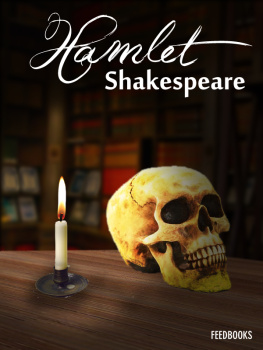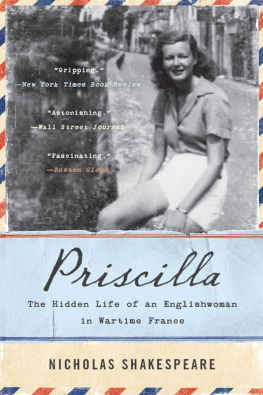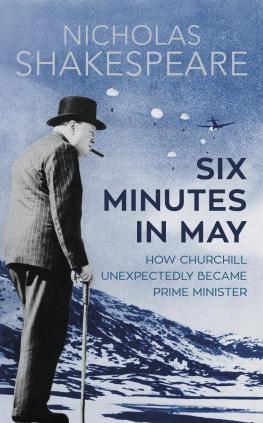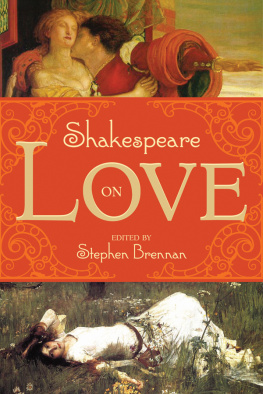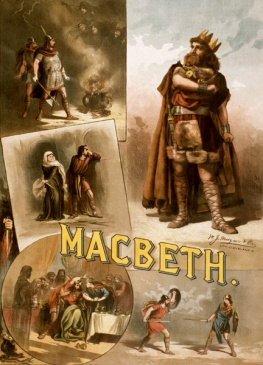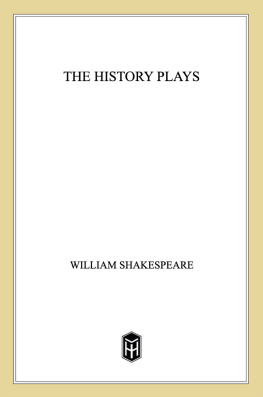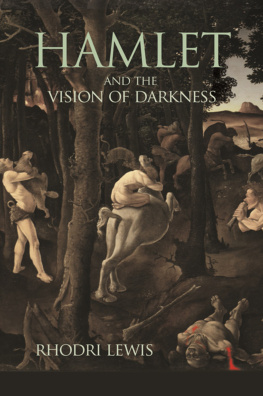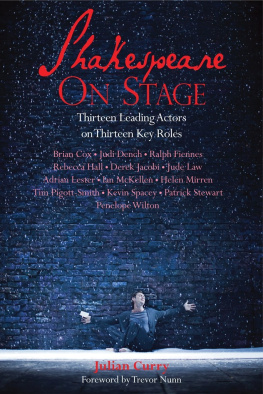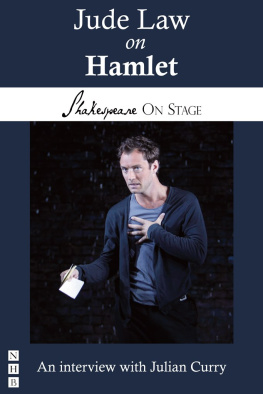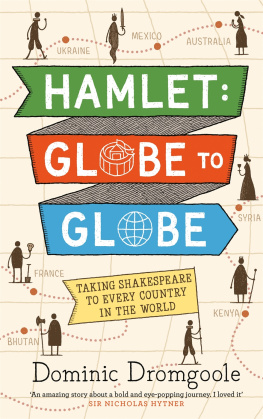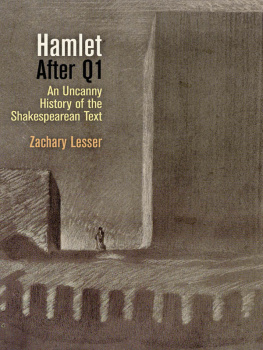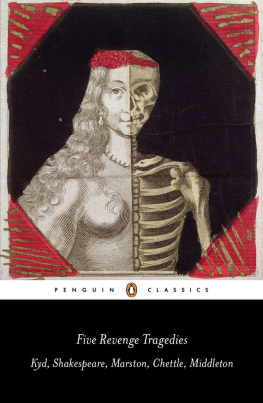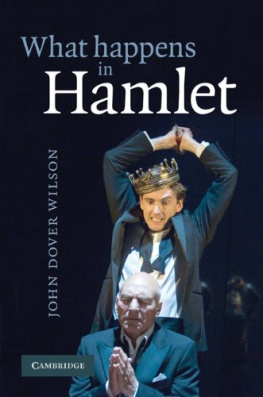About Shakespeare: William Shakespeare (baptised 26 April 1564 died 23 April1616) was an English poet and playwright, widely regarded as thegreatest writer in the English language and the world's pre-eminentdramatist. He is often called England's national poet and the "Bardof Avon" (or simply "The Bard"). His surviving works consist of 38plays, 154 sonnets, two long narrative poems, and several otherpoems. His plays have been translated into every major livinglanguage, and are performed more often than those of any otherplaywright. Shakespeare was born and raised in Stratford-upon-Avon.At the age of 18 he married Anne Hathaway, who bore him threechildren: Susanna, and twins Hamnet and Judith. Between 1585 and1592 he began a successful career in London as an actor, writer,and part owner of the playing company the Lord Chamberlain's Men,later known as the King's Men.
He appears to have retired toStratford around 1613, where he died three years later. Few recordsof Shakespeare's private life survive, and there has beenconsiderable speculation about such matters as his sexuality,religious beliefs, and whether the works attributed to him werewritten by others. Shakespeare produced most of his known workbetween 1590 and 1613. His early plays were mainly comedies andhistories, genres he raised to the peak of sophistication andartistry by the end of the sixteenth century. Next he wrote mainlytragedies until about 1608, including Hamlet, King Lear, andMacbeth, considered some of the finest examples in the Englishlanguage. In his last phase, he wrote tragicomedies, also known asromances, and collaborated with other playwrights.
Many of hisplays were published in editions of varying quality and accuracyduring his lifetime, and in 1623 two of his former theatricalcolleagues published the First Folio, a collected edition of hisdramatic works that included all but two of the plays nowrecognised as Shakespeare's. Shakespeare was a respected poet andplaywright in his own day, but his reputation did not rise to itspresent heights until the nineteenth century. The Romantics, inparticular, acclaimed Shakespeare's genius, and the Victorianshero-worshipped Shakespeare with a reverence that George BernardShaw called "bardolatry". In the twentieth century, his work wasrepeatedly adopted and rediscovered by new movements in scholarshipand performance. His plays remain highly popular today and areconsistently performed and reinterpreted in diverse cultural andpolitical contexts throughout the world. Elsinore. Elsinore.
A platform before thecastle.
FRANCISCO at his post. Enter to him BERNARDOBERNARDO Who's there?
FRANCISCO Nay, answer me: stand, and unfold yourself.
BERNARDO Long live the king!
FRANCISCO Bernardo?
BERNARDO He.
FRANCISCO You come most carefully upon your hour.
BERNARDO 'Tis now struck twelve; get thee to bed, Francisco.
FRANCISCO For this relief much thanks: 'tis bitter cold,
And I am sick at heart.
BERNARDO Have you had quiet guard?
FRANCISCO Not a mouse stirring.
BERNARDO Well, good night.
If you do meet Horatio and Marcellus,
The rivals of my watch, bid them make haste.
FRANCISCO I think I hear them. Stand, ho! Who's there?
Enter HORATIO and MARCELLUSHORATIO Friends to this ground.
MARCELLUS And liegemen to the Dane.
FRANCISCO Give you good night.
MARCELLUS O, farewell, honest soldier:
Who hath relieved you?
FRANCISCO Bernardo has my place.
Give you good night.
ExitMARCELLUS Holla! Bernardo!
BERNARDO Say,
What, is Horatio there?
HORATIO A piece of him.
BERNARDO Welcome, Horatio: welcome, good Marcellus.
MARCELLUS What, has this thing appear'd again to-night?
BERNARDO I have seen nothing.
MARCELLUS Horatio says 'tis but our fantasy,
And will not let belief take hold of him
Touching this dreaded sight, twice seen of us:
Therefore I have entreated him along
With us to watch the minutes of this night;
That if again this apparition come,
He may approve our eyes and speak to it.
HORATIO Tush, tush, 'twill not appear.
BERNARDO Sit down awhile;
And let us once again assail your ears,
That are so fortified against our story
What we have two nights seen.
HORATIO Well, sit we down,
And let us hear Bernardo speak of this.
BERNARDO Last night of all,
When yond same star that's westward from the pole
Had made his course to illume that part of heaven
Where now it burns, Marcellus and myself,
The bell then beating one,
Enter GhostMARCELLUS Peace, break thee off; look, where it comes again!
BERNARDO In the same figure, like the king that's dead.
MARCELLUS Thou art a scholar; speak to it, Horatio.
BERNARDO Looks it not like the king? mark it, Horatio.
HORATIO Most like: it harrows me with fear and wonder.
BERNARDO It would be spoke to.
MARCELLUS Question it, Horatio.
HORATIO What art thou that usurp'st this time of night,
Together with that fair and warlike form
In which the majesty of buried Denmark
Did sometimes march? by heaven I charge thee, speak!
MARCELLUS It is offended.
BERNARDO See, it stalks away!
HORATIO Stay! speak, speak! I charge thee, speak!
Exit GhostMARCELLUS 'Tis gone, and will not answer.
BERNARDO How now, Horatio! you tremble and look pale:
Is not this something more than fantasy?
What think you on't?
HORATIO Before my God, I might not this believe
Without the sensible and true avouch
Of mine own eyes.
MARCELLUS Is it not like the king?
HORATIO As thou art to thyself:
Such was the very armour he had on
When he the ambitious Norway combated;
So frown'd he once, when, in an angry parle,
He smote the sledded Polacks on the ice.
'Tis strange.
MARCELLUS Thus twice before, and jump at this dead hour,
With martial stalk hath he gone by our watch.
HORATIO In what particular thought to work I know not;
But in the gross and scope of my opinion,
This bodes some strange eruption to our state.
MARCELLUS Good now, sit down, and tell me, he that knows,
Why this same strict and most observant watch
So nightly toils the subject of the land,
And why such daily cast of brazen cannon,
And foreign mart for implements of war;
Why such impress of shipwrights, whose sore task
Does not divide the Sunday from the week;
What might be toward, that this sweaty haste
Doth make the night joint-labourer with the day:
Who is't that can inform me?
HORATIO That can I;
At least, the whisper goes so. Our last king,

